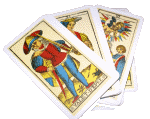
Bohemian Gothic Tarot
TEN OF PENTACLES
Lighter or more conventional meanings
Prosperity * Reaching a stable, secure position in business or family life * Feeling content on the whole, but there's a hint of a feeling that you've missed out on some of the magic in life * Firmly choosing material comfort over more spiritual or mystical pursuits.
Darker, shadow or more hidden meanings
Reassessing the importance of money and materialism * A brush with something magical, though you may not recognise it at the time * Being willing to stoop low for some material gain.This is one of the most curious and mysterious cards in the traditional RWS tarot. Logically, as the Ten of the suit that's all about material and earthly matters it ought to straightforwardly indicate financial success and achievement in skills and crafts. In one respect, it does, and it can often be read in this simple way. However, while the RWS card shows a happy, apparently prosperous couple in addition it features an old man, dressed in robes that could suggest he is a magician, seated at an archway next to two dogs. It introduces an element of magic and ambiguity that's unexpected in this most practically-focused of suits. There is a feeling that magic has been shut out of the young couple's life, perhaps a hint that although they seem, on the surface, to have everything, they have focused too much on material comfort to the exclusion of the more mysterious, philosophical or spiritual things in life. It's this that the old man represents.
Our version builds on this idea of the meeting - or "almost meeting" of a kind of magic and materialism. It shows a night-time scene that has a distinctly strange atmosphere. A young, and obviously loving, gypsy couple walk past a large, decrepit door carved with a circular motif. As they pass, the door opens a crack and an older man, well groomed with powdered wig, peers out at them, a disturbing gleam in his eye. His dog also stares at the couple. What's about to happen and what are the well-to-do man's intentions?
This card asks us to consider how important material things really are. The young couple have, as far as we can guess, love, spirituality and some special magic in their relationship. But they clearly have no money. The older man may be the opposite; he has a grand, if decaying house but perhaps he has no affection or friendship. If so, then who should envy whom? The young couple look very ragged, the girl is barefoot and we wonder if that bundle over the young man's shoulder is all that they possess. But they do have each other. Maybe the older man is about to set his dog on them to try to drive them away. But he could also be about to invite them in, to shelter in his house. If so, we wonder if they would accept his invitation at their peril; by the look in his eye the man at the door may have something nefarious planned. It could be that he intends to exploit these two for his own gain. We can't be sure, but somehow, looking at this image, we hope that the young couple will simply continue on their way unaware of the lurking threat and unharmed by it. This card asks us to think carefully about the real value of material wealth. It suggests it should often take second place in our lives to values like friendship, love and trust. These things are far more magical and deeply satisfying than mere money can ever be. It's a simple message, but one that it's useful to be reminded about in the very materialistic times we live in.
Some further ways to consider this card
Consider why the young couple are walking past this house. Are they newly in town, are they lost, or going somewhere familiar to them? How do you imagine their story?Who is the older man? Is he the master of the house or a servant? Does he definitely represent a threat to the young couple or could he come to their aid in some way?
`Well,' said Mrs. Bunch, `the little girl I don't seem to recollect so much about. I know master brought her back with him from his walk one day, and give orders to Mrs. Ellis, as was housekeeper then, as she should be took every care with. And the pore child hadn't no one belonging to her - she telled me so her own self - and here she lived with us a matter of three weeks it might be; and then, whether she were somethink of a gipsy in her blood or what not, but one morning she out of her bed afore any of us had opened a eye, and neither track nor yet trace of her have I set eyes on since. Master was wonderful put about, and had all the ponds dragged; but it's my belief she was had away by them gipsies, for there was singing round the house for as much as an hour the night she went, and Parkes, he declare as he heard them a-calling in the woods all that afternoon. Dear, dear! a hodd child she was, so silent in her ways and all, but I was wonderful taken up with her, so domesticated she was - surprising.'
- M.R. James, "Lost Hearts" Ghost Stories of an Antiquary.









